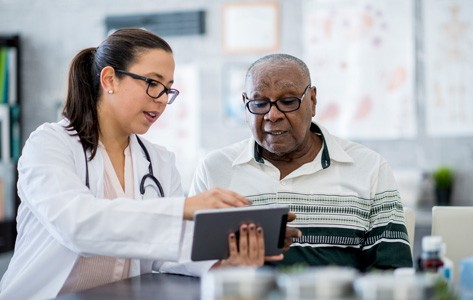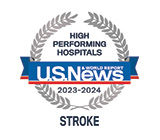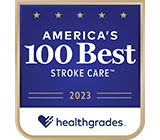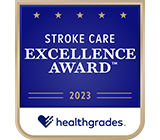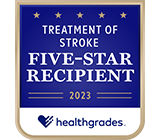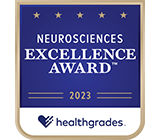Chilton Medical Center
Hackettstown Medical Center
Morristown Medical Center
Newton Medical Center
Overlook Medical Center
When it comes to treating strokes, time is brain – in other words, the faster a patient receives care, the greater his or her chances are of making a full recovery. Call 911 as soon as symptoms begin.
The stroke centers of Atlantic Health System Neuroscience provide 24/7 diagnostic and treatments services, including:
- Rapid® automated brain imaging
- – This new class of software allows our neurology specialists to swiftly determine if a patient has reduced blood flow to the brain or other signs of brain injury. As a result, we can treat a greater number of patients within the window during which surgery and other therapies can be helpful.
- Computed tomography (CT)
- – Using X-ray images that create a detailed image of the brain, CT scans play a key role in determining if a patient is having a stroke and what type they may be experiencing. Doctors may sometimes also inject a dye into the patient’s blood stream so they can see the blood vessels in the brain in greater detail – also known as CT angiography.
- Laboratory services
- – These tests give health care providers an understanding of a patient’s blood clotting time, if an infection is present, as well as glucose levels and blood chemistry – all of which must be managed as part of stroke treatment.
- Magnetic resonance imaging (MRI)
- – Using powerful radio waves and magnets to create detailed images, an MRI can detect if brain tissue has been damaged by an ischemic stroke or hemorrhage.
- Carotid ultrasound
- – This test uses sound waves to give health care providers an inside look at the neck’s carotid arteries, thereby revealing the blood flow and any fatty deposits, or plaque, that may be present.
- Intravenous thrombolysis
- – Medications known as a “clot busters” are administered to break up or dissolve blood clots. These have shown improved outcomes when provided within four and a half hours after stroke symptoms begin.
- Transcranial Doppler
- – Doppler ultrasound measures the speed of blood flow in blood vessels and arteries. This noninvasive technique also assesses blood vessel spasm following subarachnoid hemorrhage and other types of stroke.
Advanced Stroke Diagnostics and Treatments
Patients with complex stroke conditions that require specialized care may be transported via helicopter or ambulance to our state-designated Comprehensive Stroke Centers at Morristown Medical Center and Overlook Medical Center. There, they will have access to some of the most advanced technology and surgical techniques, such as:
- Biplane neuroangiography
- – This technology creates a three-dimensional image of the brain with just one dye injection, greatly simplifying the task of defining abnormalities and planning treatment. Not only are the images far superior to standard x-rays, but the patient requires fewer dye injections, minimizing risk and discomfort.
- Endovascular thrombectomy
- – Endovascular surgeons use a clot retrieval device to capture and remove a clot in the brain up to twenty-four hours following the onset of an ischemic stroke. Other endovascular interventions include aneurysm clipping and coiling.
- Intra-operative angiography
- – In this procedure, x-ray dye is injected into the brain’s arteries during brain surgery, providing real time, immediate feedback to the surgeon, which improves accuracy and outcomes.
- Intracranial angioplasty and stenting
- – Stenosis, or narrowing of brain arteries, can lead to stroke. Neurosurgeons can treat stenosis by feeding a catheter into the narrowed artery, opening the narrowed segment with a tiny balloon, and then keeping the artery open with a metal tube (stent), improving blood flow. The procedure, available at Overlook Medical Center only, is similar to using stents for blocked arteries in the heart.
- Carotid angioplasty and stenting
- – Significant narrowing of the carotid artery can substantially increase the risk of stroke. Without using surgery, neurointerventionalists can enlarge the artery from within and put a stent in place to keep the artery open. Patients with carotid stenosis who have severe heart disease or other conditions which render them poor candidates for surgery can be treated with these procedures.
- Carotid endarterectomy
- – This surgical procedure removes plaque buildup in the arteries, one of the man causes of restricted blood flow to the brain.
- Embolization
- – To minimize the risk and difficulty of surgery, coils, balloons, beads and adhesives are used to block off the blood supply to an artery, either obliterating abnormal blood vessels or tumors, or greatly decreasing blood flow. This procedure is available at Overlook Medical Center only.
- 320 Slice Computed Tomography (CT)
- – A major step forward in CT technology, the 320-slice scanning machine at Overlook Medical Center is capable of scanning the entire brain in less than one third of a second, rapidly producing high quality, detailed images of the brain and measuring subtle changes in blood flow or minute blockages in blood vessels with a minimal dose of radiation.
- Vagus Nerve Stimulation
- – A form neuromodulation that is used as a treatment option for several neurological conditions including impaired upper limb mobility caused by a stroke. VNS increases neuroplasticity by sending electrical pulses to the brain through the vagus nerve which release neuromodulators which create or strengthen neural connections to enhance the relevance of physical therapy and improve upper limb function.
Stroke Rehabilitation
Acute rehabilitation is an important part of recovery. Patients at our stroke centers receive physical, occupational and speech therapy, plus social work services and assistance with discharge planning. Stroke treatment and prevention education is also provided to both patients and family members. Learn more about stroke rehabilitation >
Locations
-
Chilton Medical Center
-
Stroke Center at Chilton Medical Center
-
97 West Parkway
Pompton Plains, NJ 07444
- In a medical emergency, please call 911. Stroke care is available 24/7 at our medical centers.
- If you have a question about our stroke program, please call 973-831-5385 Monday through Friday, 8:00am to 4:00pm.
-
97 West Parkway
-
Hackettstown Medical Center
-
Stroke Center at Hackettstown Medical Center
-
651 Willow Grove Street
Hackettstown, NJ 07840
- In a medical emergency, please call 911. Stroke care is available 24/7 at our medical centers.
- If you have a question about our stroke program, please call 908-441-1298 Monday through Friday, 10:00am to 2:00pm.
-
651 Willow Grove Street
-
Morristown Medical Center
-
Comprehensive Stroke Center at Morristown Medical Center
-
100 Madison Avenue
Morristown, NJ 07960
- In a medical emergency, please call 911. Stroke care is available 24/7 at our medical centers.
- If you have a question about our stroke program, please call us at 973-971-4412 Monday through Friday, 8:00am to 4:00pm.
-
100 Madison Avenue
-
Newton Medical Center
-
Stroke Center at Newton Medical Center
-
175 High Street
Newton, NJ 07860
- In a medical emergency, please call 911. Stroke care is available 24/7 at our medical centers.
- If you have a question about our stroke program, please call 973-579-8572 Monday through Friday, 8:00am to 4:00pm.
-
175 High Street
-
Overlook Medical Center
-
Outpatient Stroke Center at Overlook Medical Center
-
99 Beauvoir Avenue
Fifth Floor, Outpatient Neuroscience
Summit, NJ 07901
- 908-522-5545
- In a medical emergency, please call 911. Stroke care is available 24/7 at our medical centers.
-
99 Beauvoir Avenue
Breaking Through the Stroke Survivor Plateau
Some stroke survivors struggle to regain full function of their arm and hand after a stroke. However, an Atlantic Health System neurosurgeon is helping to change this. Ronald Benitez, MD, recently became the first neurosurgeon in New Jersey to use a promising new technology for ischemic stroke survivors - an implantable device paired with vagus nerve stimulation (VNS).
Request More Information
Please use the form to request more information.
All fields are required.
Please note that this form is for North American residents only.
Awards and Accreditations

Overlook Medical Center

Chilton Medical Center
Hackettstown Medical Center
Morristown Medical Center
Newton Medical Center
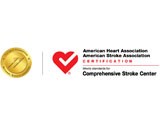
Overlook Medical Center has received the Disease-Specific Care Advanced Comprehensive Stroke Center Certification from The Joint Commission and the American Heart Association/American Stroke Association.
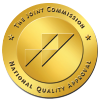
Chilton, Hackettstown, Morristown, Newton and Overlook medical centers are certified Primary Stroke Center by The Joint Commission.


